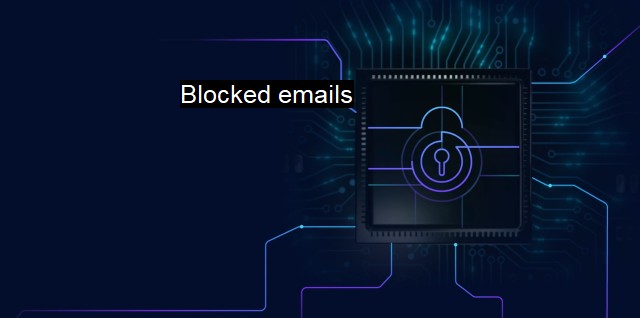What are Blocked emails?
Keeping Your Inbox Safe: The Importance of Blocking Suspicious Emails to Prevent Cyber Threats
Blocked emails are an essential aspect of cybersecurity efforts that are executed by internet security protocols and antivirus programs to protect email users from exposure to harmful content or exploitation by cybercriminals. They prevent marketers, hackers, or other entities from compromising your security through emails containing malware, spam, or phishing attempts. By implementing blocking rules or criteria, the email provider reduces the risk of cyber attacks.In cybersecurity terms, a blocked email is one that is not delivered to its intended recipient but is instead redirected or detained by an email filter system, incorporating antivirus protection features. This typically happens when an email is perceived as posing a threat to the user's data security or when it violates some preset filter criteria, which could range from keyword usage to email addressing standards.
The email filtering system works based on certain parameters set by either the internet service provider (ISP) or email client like Microsoft materials. This includes blocking words and phrases that might be related to known scams, blocking email from specified sources or IP addresses, scanning attachments for viruses or malware, and detecting suspicious hyperlinks. In many cases, these filters are so effective that most email users do not witness most of the blocked messages.
Email blocking software plays a crucial role in cybersecurity because it prevents malicious actors from harming a user via email. According to the Symantec Internet Security Threat Report, one in 412 emails contains a malware attack. When considering the massive volume of emails transmitted daily, this statistic is alarming. Blocked emails function as the first line of defense against such hazards.
Different types of attacks can occur via a single email. spam refers to bulk unwanted email. These messages feature commercialized advertisements or sexually explicit material. Circulated massively, these emails simply clutter your inbox and reduce your productivity. Frequently, these messages might contain a malicious attachment or a phishing scam.
Phishing is another cyber threat enacted through emails. Cybercriminals designed these emails to mimic credible sources to dupe the user into parting with sensitive information such as account numbers, passwords, and credit card data.
Emails with an executable file ending in .exe in an attachment or hyperlink are blocked as they often contain viruses or other malicious programs. Emails with impersonal salutations acknowledging you as 'client' or 'customer' are also typically deemed suspicious.
Blocked emails also protect against malware, a harmful code developed to either gain unauthorized access to a computer system, steal confidential information or cause damage. Most malware programs are sent as email attachments. Once the attachment, often a .doc or .zip file, is opened, the malware is downloaded onto the user's device, causing either data loss or legal troubles.
In sum, the receiving and opening of trusted emails are central to cybersecurity. This inevitably demands the use of blocked emails to deny untrustworthy or risky emails. Users are not always keen to distinguish between clean and potential risky emails, often leading to accidental openings of harmful content, something that might lead to inevitable cybersecurity compromises. Therefore, the implementation of AVG spam filters or Norton antivirus is crucial in dodging the spectrum of potential cyber threats. Users should also continually update their antivirus software and exercise caution by checking email headers and attachments to ensure their cybersecurity.

Blocked emails FAQs
What does it mean when an email is blocked?
When an email is blocked, it means that the message was not delivered to its intended recipient because the sender's email server was prevented from sending it. The reasons for this can vary, but it's usually due to security measures that are in place to protect against spam or malicious messages.Why are some emails blocked by antivirus software?
Antivirus software may block emails that contain suspicious attachments or links that could potentially harm your computer or compromise your security. These messages may also be blocked if they come from a known spammer or if the sender's email address or domain has been blacklisted.What should I do if my email is being blocked?
If your email is being blocked, you should contact your email provider or IT department for assistance. They may be able to identify the reason why your messages are being blocked and help you resolve the issue. In some cases, you may need to take additional steps to improve the security of your email account, such as changing your password or enabling two-factor authentication.How can I prevent my emails from being blocked?
To prevent your emails from being blocked, make sure that your messages comply with best practices for email security and avoid engaging in activities that could be seen as spamming or phishing. This includes avoiding the use of suspicious links or attachments, keeping your email list up-to-date, and using reputable email services that are known for their security and anti-spam features. You should also keep your antivirus software updated and run regular scans of your computer to ensure that it is free of malware or other security threats.| | A | | | B | | | C | | | D | | | E | | | F | | | G | | | H | | | I | | | J | | | K | | | L | | | M | |
| | N | | | O | | | P | | | Q | | | R | | | S | | | T | | | U | | | V | | | W | | | X | | | Y | | | Z | |
| | 1 | | | 2 | | | 3 | | | 4 | | | 7 | | | 8 | | |||||||